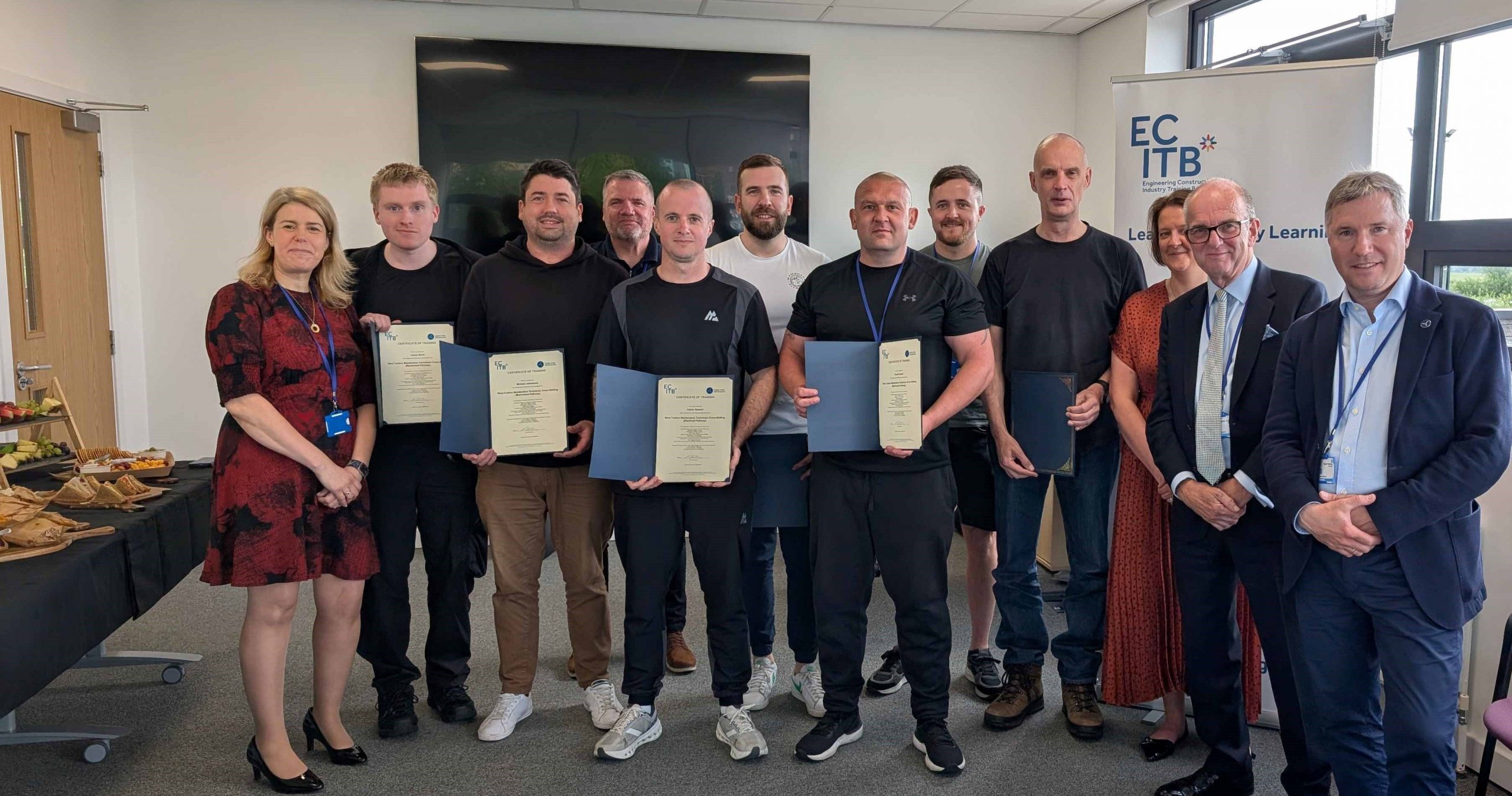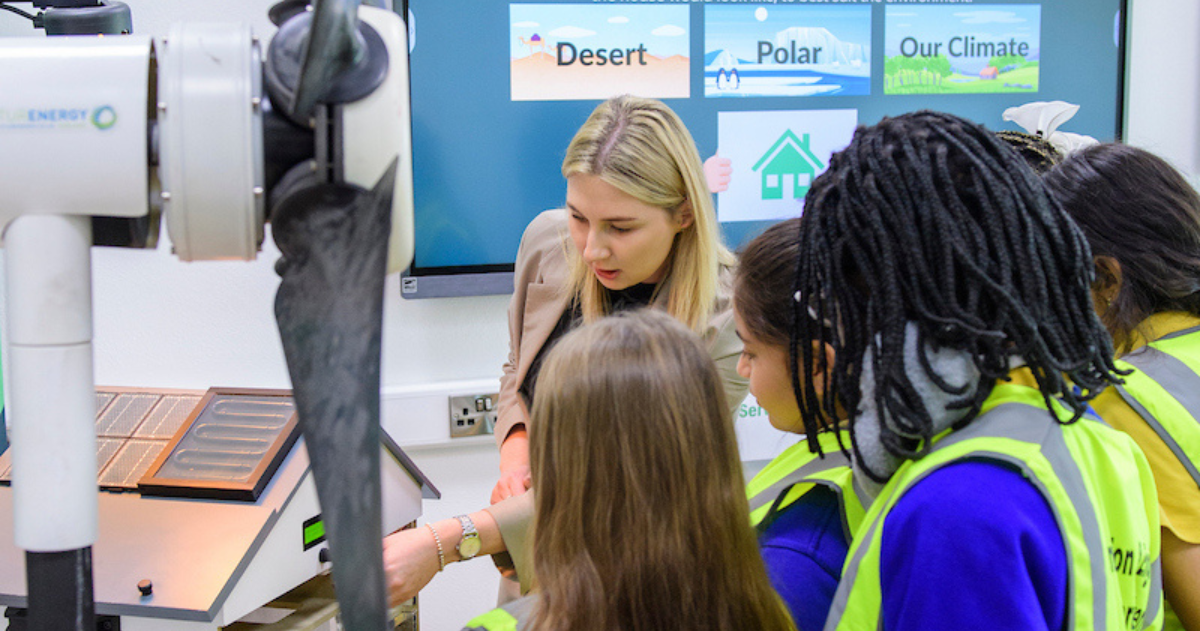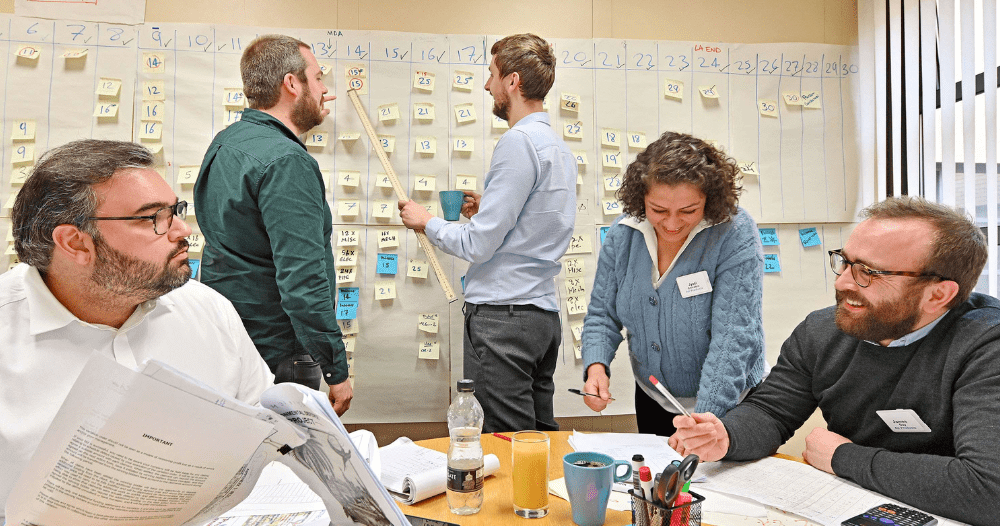Delivering an integrated technician workforce for a just energy transition between oil and gas to wind has moved a step closer, thanks to a pilot cross-skill programme in Aberdeen and Grangemouth.
Following the announcement in February, the programme started in May. Eight learners completed the six-week programme at Grangemouth last week and a further seven will complete the programme in Aberdeen this Friday (27 June 2025).
The pilot programme developed by the Engineering Construction Industry Training Board (ECITB), in partnership with Global Wind Organisation (GWO) and the Offshore Renewable Energy (ORE) Catapult, supports two-way deployments across oil & gas and wind infrastructure.
Main photo: Learners receive certificates at Forth Valley College from Andrew Hockey, CEO of the ECITB and Sergei Perapechka, Head of Partnerships and Network Development at GWO (right).
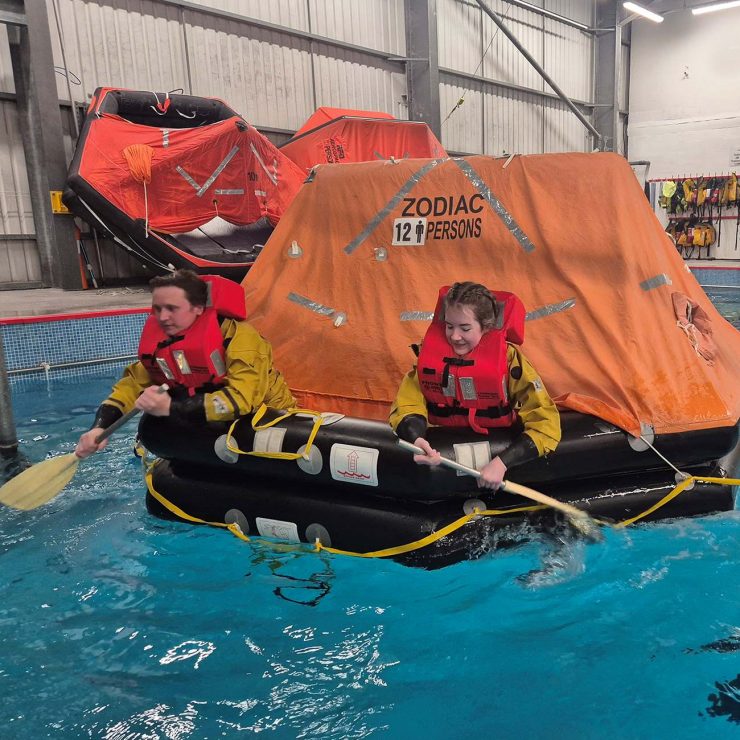
Deployment onto wind farms following wind turbine cross-skill pilot
The wind turbine cross-skill pilot recognised prior learning and ongoing competence of qualified oil and gas technicians and delivered a task-based programme of technical activity across electrical, mechanical and instrument pathways as well as wind-specific GWO training and on-site turbine familiarisation.
The 15 learners include employees from Wood, Petrofac, Semco Maritime and Ponticelli, as well as ECITB-supported individuals and five former Mechanical Technicians from Grangemouth Oil Refinery.
Many of the learners will move immediately to roles on wind assets.
Interviews are taking place with the refinery workers and industry employers, with one already securing a role with Wood.
Photo: learners completing the GWO Basic Safety Training (BST) – sea survival.
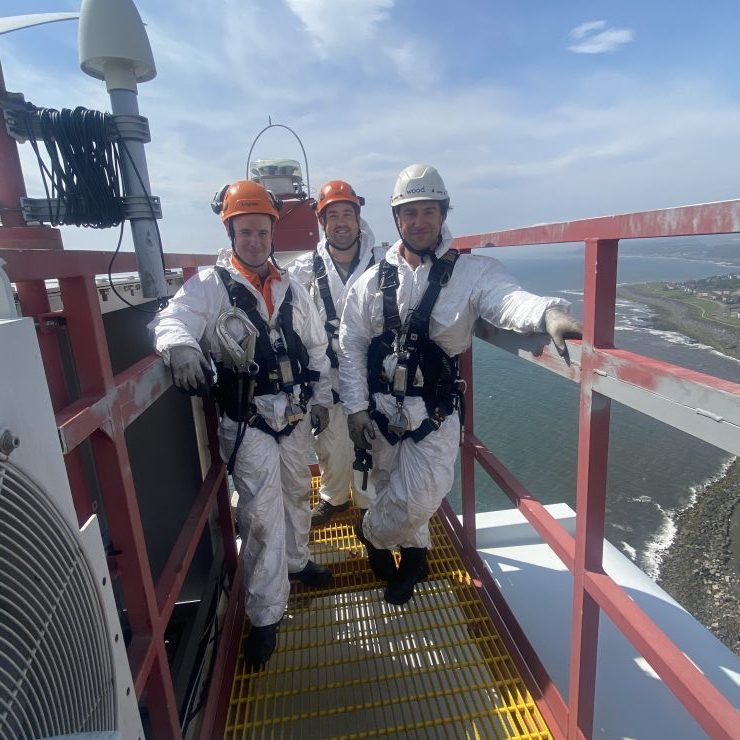
Niall Gibb was one of the learners at Grangemouth.
He said: “The chance for time-served technicians to draw on years of experience while building on their existing skillsets resonated strongly with my own ambition for personal and professional development.
“I viewed the programme as a crucial pathway to transition from Oil & Gas into the renewable energy sector.
“With over a decade of offshore experience, I was eager to apply my skills in a growing and future-focused industry.
“The training and support provided were instrumental in helping me secure a role with GE Vernova after the programme, where I will be joining the team as a Lead Electrical Commissioning Technician at Dogger Bank — the world’s largest offshore wind farm.
“This programme has been a genuinely transformative step in my career. I would strongly encourage energy professionals looking towards a greener future to seriously consider this ambitious and successful cross-skilling initiative.”
Photo (L-R): Calvin Stewart, Michael Johnstone and Niall Gibb at the top of Levenmouth demonstration wind turbine.
“Aurora Energy is pleased to support the cross-skilling programme and recognise this initiative as a sound building block for introducing future wind technicians into the wind industry.
“We are delighted to be welcoming one of the programme learners to our full-time team and hope to welcome many more in the near future into our growing organisation.”
Andrew Elrod
Director of Training at Aurora Energy Services
“Wood is committed to investing in energy transition skills to help us attract, retain and develop talent in support of an integrated energy system.
“We are pleased that several of our technicians have successfully completed ECITB’s new cross-skilling programme, aimed at supporting worker transferability between oil and gas and wind operations and maintenance.
“Our employees have enjoyed the programme and will soon be supporting one of our clients on a summer maintenance campaign at a North Sea wind farm as a result.”
Kenny Hay
Senior O&M Consultant – Energy Transition, at Wood

“There is a clear case to support the industry’s supply chain to cross-skill existing workers to service both the operations and maintenance of late-life oil and gas assets whilst also being deployed to wind.
“It is vital we maintain the appropriate standards of technical skills and behavioural safety across the engineering construction sectors and the two-way transition of skilled workers between sectors will help improve safety, workforce mobility and the resilience of the industry.”
Andrew Hockey
CEO of the ECITB
Wind turbine technicians in demand
Current UK-installed wind capacity needs to double for both onshore and offshore wind if the UK Government targets are to be met by 2030. But the recent Skills Intelligence report released this week by RenewableUK and OWIC identifies Wind Turbine Technicians as the most in-demand occupation with an average shortfall of over 11,000 technicians annually over the next 5 years. Regional analysis also shows the highest workforce concentrations will be in coastal and Scottish regions.
ECITB is currently reviewing feedback from the learners, training providers and employers and aims to have a final programme widely available through its technical training providers in the Autumn.
The ECITB funded the training for all workers and received additional support for the five workers from Grangemouth refinery, which were co-funded by the Scottish Government.

Training was delivered at Forth Valley and North East Scotland Colleges and GWO / ECITB-approved training provider, RelyOn.
Learners also completed elements of the programme inside the nacelle of a wind turbine at ORE Catapult’s Levenmouth demonstration turbine.
Pre-requisites to the programme included assurance of ongoing technical competence aligned to a workers’ primary technician trade through the Connected Competence scheme.
This base standard is recognised in the Energy Skills Passport and will help provide a clear pathway for re-skilling when the passport is further developed this year.
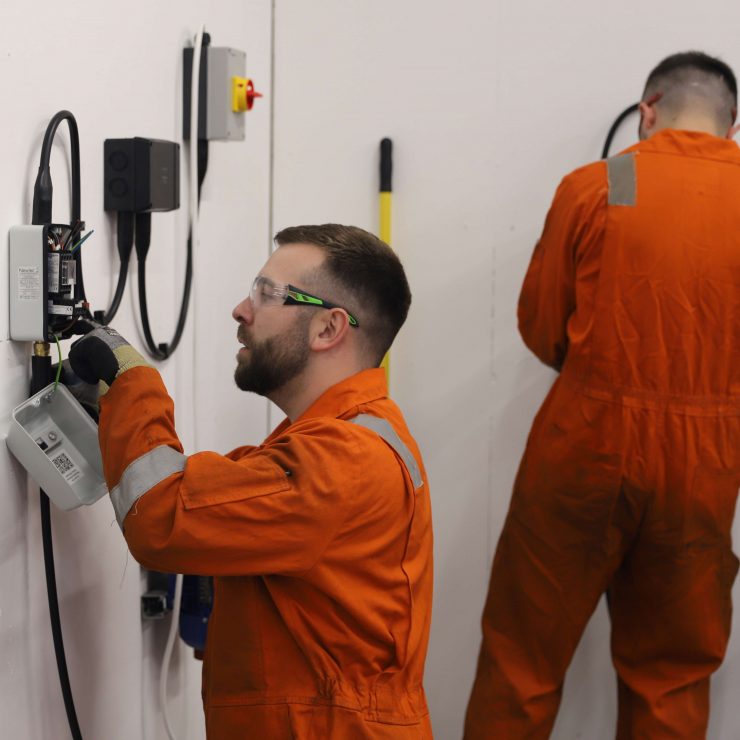
Wind turbine cross-skill pilot recognised prior learning
The six-week training included task-based cross-skilling activities across electrical, mechanical and instrumentation pathways as well as GWO’s wind-specific safety training.
This includes Slinger Signaller, enhanced first aid, working at height, manual handling, fire awareness, sea survival and GWO’s Basic Technical Training (BTT)* through its REcognition scheme.
Photo: Learners covering the electrical activities on the wind turbine cross-skill pilot at Forth Valley College (FVC)
“The renewable energy sector relies on industry standards bodies to work together so we can help build a skilled workforce quickly. GWO training providers are now playing a key role in providing recognition for prior learning and this pilot is a perfect example.
“When applied to industry-recognised schemes such as ECITB’s Connected Competence, GWO REcognition scheme can reduce training time for workers, and help them focus on the domain specific knowledge they will need to apply their skills in a wind turbine environment.”
Jakob Lau Holst
CEO of GWO
* GWO Basic Technical Training (BTT) is an entry-level course for the wind energy industry, equipping participants with essential skills to perform basic technical tasks in a wind turbine environment. The GWO BTT covers modules in mechanical, electrical, hydraulic and bolt tightening.
About Global Wind Organisation (GWO)
Global Wind Organisation is a non-profit industry association founded and owned by its members who are drawn from globally leading renewable energy manufacturers, owners and operators.
GWO members strive for an injury-free work environment, setting common international standards for safety training and workforce development.
About Offshore Renewable Energy (ORE) Catapult
ORE Catapult is the UK’s leading technology innovation and research centre for offshore renewable energy. It plays a key role in delivering the UK’s Net Zero targets by accelerating the creation and growth of UK companies in the offshore renewable energy sector.
It was established in 2013 by the UK Government, as part of a network of Catapults set up by InnovateUK in high-growth industries. Its mission is to deliver the UK’s largest clean growth opportunity by accelerating the creation and growth of UK companies in offshore renewable energy.
About Connected Competence
Through industry-recognised, standardised testing, Connected Competence assures an ongoing base level of technical competence for workers across the engineering construction industry to create a safer, technically competent and transferable workforce.
On successful completion of the technical tests, workers are awarded a test certificate and a digital badge. The digital badge is owned by the worker and moves with them ensuring their technical competence is recognised by other employers as they move across sites.

